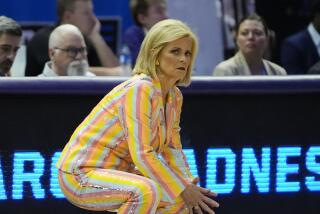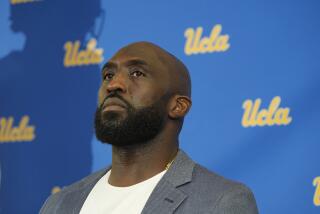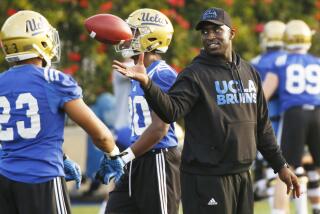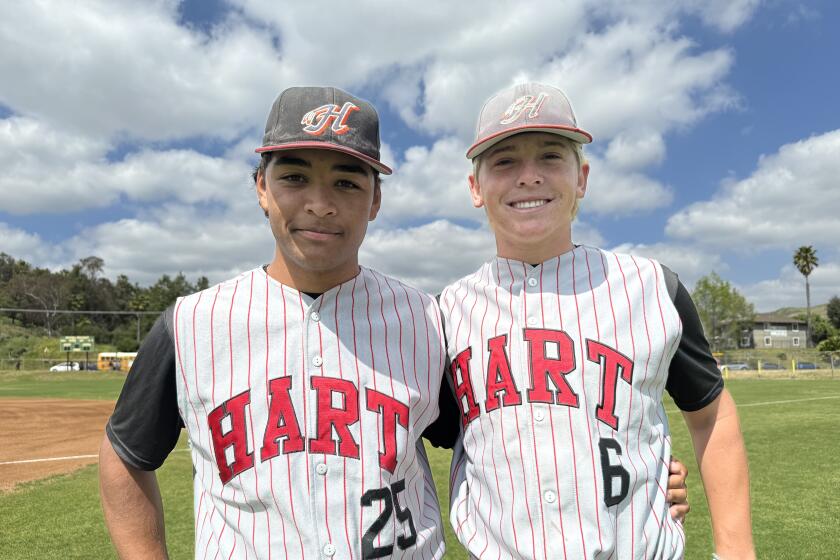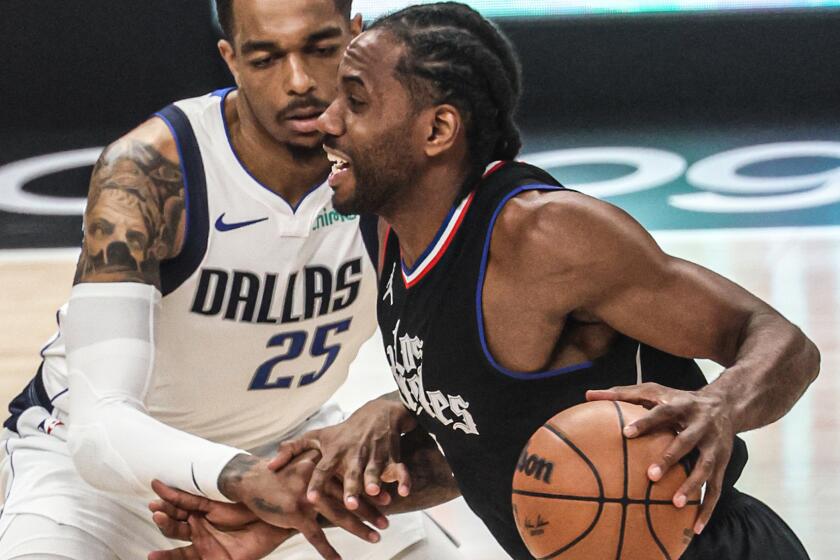UCLA Athletic Director Dan Guerrero: Life in a very public eye
This all happened years ago, long before Dan Guerrero became the athletic director at UCLA, before he had to worry about hiring and firing coaches, before the critics came after him.
It was the early 1980s and Guerrero figured he was done with sports, having retired from playing pro baseball in Italy.
Back home in Wilmington, he joined with some friends — they had been teenage volunteers at a youth center in the old days — to start a nonprofit agency that renovated homes and built facilities for the community.
“That’s where I thought my career was headed,” he said. “It was going to be in public service.”
But then the baseball team at nearby Cal State Dominguez Hills needed money and Guerrero helped with fundraising. School officials were so impressed, they wondered if he’d ever considered working in athletic administration.
“No,” he said. “What’s that?”
The university offered him a deal: If he signed on as an unpaid assistant in the athletic department, he could earn a living by teaching leadership and government classes on the side.
Talking it over with his wife, the 32-year-old Guerrero warmed to the idea of a change, if only because his career at the time seemed headed toward politics, running for city council or maybe Congress.
“I don’t want to go that direction,” he recalled saying. “I don’t really want a public life.”
Going public
These days, Guerrero has nowhere to hide, not with angry fans calling for his head on websites and in letters to the editor.
It might seem odd, given that his department has produced 22 national champions in 12 sports over the past decade — the most of any major college in the nation — while operating under one of the Pac-12 Conference’s strictest budgets. UCLA’s teams have performed in the classroom and steered clear of NCAA infractions.
But, for better or worse, athletic directors are judged on their record in the two major revenue-producing sports and, in that area, UCLA has struggled.
The slumping football team has been through four head coaches in nine years. The once-mighty basketball program is reeling too, with Coach Ben Howland the subject of recent media reports that portrayed a team spinning out of control.
Even the much-needed $185-million renovation of Pauley Pavilion has become a sore point among boosters facing higher ticket prices. Richard Bergman, an influential supporter who has butted heads with Guerrero over design elements of the project, said: “He’s a very bright man who has made some poor decisions.”
Guerrero, 60, knows he is on the hot seat. Though not entirely comfortable talking to reporters, he agreed to a series of interviews in his office overlooking a plaza at the center of campus.
His style was casual if academic. That included his dress — sports coat, open collar — and a habit of lacing answers with detail and the occasional historic quote. He talked about trying to keep a steady course through troubled waters.
“You have all these factions,” he said. “Someone once said, ‘I can’t tell you the secret to success, but I can tell you the secret to failure — trying to appease everyone.’”
Friends insist that beneath his calm persona lies utter determination. Still, this is not the future Guerrero envisioned for himself in younger days.
Seeking to serve
Wilmington was a rough town in the 1960s, an ethnic mix of blue-collar families. Back then, longshoremen could bequeath their union membership to their offspring, so a lot of boys figured to end up on the docks.
The son of an oil refinery worker, Guerrero had other ideas. He began hanging around the Teen Post, a youth center created as part of President Lyndon B. Johnson’s War on Poverty. The director there, John Mendez, preached civic pride.
“We were told to solve problems,” said Ray Madrigal, who frequented the post. “It was a good, strong work ethic and concern for your community.”
Guerrero answered the call. A meticulous teen, he organized cultural events and field trips for the other kids. But that wasn’t his only passion.
His father had been a talented ballplayer and he followed suit, practicing relentlessly, making the All-City team at Banning High and earning a scholarship to play for the Bruins.
“My dad always told me that UCLA was a place for the people,” Guerrero said. “By that he meant if you were a minority, it was a place where you could be accepted.”
Teammates called him “Warrior” for the grit he showed at second base. When a hamstring injury ended any major league dreams, he spent the mid-1970s in Italy getting the game out of his system, then returned home to formally begin a career in public service.
Having previously worked as an administrative deputy for a city councilman, Guerrero joined Madrigal and others to form the Harbor Community Development Corp., which sought government grants to launch projects around Wilmington.
“We were greenhorns, taking on all this stuff,” Madrigal said. “We were tackling anything and everything we could to help the community.”
The agency soon named Guerrero as its executive director. While earning a master’s degree in public administration at Dominguez Hills, he ran across an old baseball friend, Andy Lopez, who coached there.
“We went to lunch one day and I was groaning about having to raise money,” said Lopez, now at Arizona. “Danny said, ‘Man, I do this for a living.’”
Changing direction
Not many athletic directors come to their jobs by way of politics and community work, but Guerrero’s unusual background served him well in a new vocation.
Dominguez Hills needed someone who could raise money and deal with athletes from low-income neighborhoods. Guerrero learned the rest of the business — selling concessions, supervising coaches, launching a marketing program — quickly enough to take over the department in 1988.
“Honestly, if my career had meant for me to stay there for 25 or 30 years, I would have been happy,” he said.
In 1992, UC Irvine asked him to save a cash-strapped athletic department that was cutting teams. Over the next decade, he oversaw a revival that included $38 million in new and improved facilities.
So it made a certain degree of sense when UCLA hired him in 2002, enamored of his administrative and financial acumen. Yet, from the very start, some fans worried about a gap in his resume — he had no experience in the tricky business of big-time football or basketball.
Nearly a decade later, Guerrero talks about the coaches he has hired and fired since arriving at Westwood:
•Bob Toledo and Steve Lavin. When Guerrero got rid of both coaches shortly after taking charge, some accused him of wanting to put his stamp on the department. “There were things I knew that people in the external community did not,” he said. “Both of those programs needed to go in a different direction.”
•Karl Dorrell. UCLA offered Toledo’s replacement $600,000 plus incentives, not much by Division I standards. “That obviously shrinks your pool,” Guerrero said. Multiple reports had former UCLA chancellor Albert Carnesale actually making the choice, but Guerrero takes full responsibility and says that Dorrell — endorsed by prominent NFL coach Mike Shanahan — looked like a rising star.
•Howland. Guerrero still considers this a solid hire, a coach who quickly rebuilt the program and led UCLA to three straight Final Fours. He believes Howland can turn things back around.
•Rick Neuheisel. Fans and the media eyed this one with cautious optimism, a coach with the personality to battle Pete Carroll across town but also some NCAA baggage. “He was a Bruin. He wanted redemption,” Guerrero said. “By all accounts, it was the right hire at the right time.”
Around the UCLA athletic department, officials like to point out that programs such as Texas and Alabama went through numerous football coaches before finding the likes of Mack Brown and Nick Saban. But UCLA’s road has been especially rocky since Toledo.
“You can pay $2 or $2 million for a coach, and there’s never a guarantee that either of those will be successful,” Guerrero said. “It’s an art, not a science.”
Line of fire
UCLA Chancellor Gene Block made a point of joining Guerrero last week in a teleconference to address allegations about the basketball program contained in a Sports Illustrated story. If players misbehaved and the coach failed to control them, the athletic director is ultimately responsible.
“I have great confidence in Dan,” Block said. “We’re working through this together.”
His support came as no surprise; university leaders like their teams to operate within budget and stay out of NCAA trouble. They like the kind of diversity that Guerrero — one of only a few Latino athletic directors in Division I — considers imperative.
In recent years, the Bruins have won national championships in a range of nonrevenue sports such as men’s volleyball and women’s tennis and water polo.
“I don’t believe that having a strong program across the board detracts from our ability to be successful in football and men’s basketball,” Guerrero said. “Could we have diverted $7 million from our men’s and women’s Olympic programs? Would that have made a difference? There’s no guarantee.”
Away from Westwood, he has served on the powerful NCAA men’s basketball committee and been president of two athletic directors groups. But none of this mollifies UCLA fans who want winning seasons, who still doubt that his years at Dominguez Hills and Irvine prepared him for the bright lights.
Guerrero’s reticence in public may hurt him in terms of a connection with fans. At the same time, he can call upon the days when Los Angeles City Council President John S. Gibson Jr. would put young deputies “in the line of fire. We would be in front of angry constituent groups, answering questions.”
The athletic director remains optimistic about basketball and also his new football coach, Jim Mora. He knows that winning is the solution to his problems.
In the meantime, there is not much he can do about the doubts and Internet rancor. Asked if his career switch so long ago — I don’t really want a public life — seems ironic, he shrugs and replies: “Ya think?”
twitter.com/LATimesWharton
More to Read
Get our high school sports newsletter
Prep Rally is devoted to the SoCal high school sports experience, bringing you scores, stories and a behind-the-scenes look at what makes prep sports so popular.
You may occasionally receive promotional content from the Los Angeles Times.
